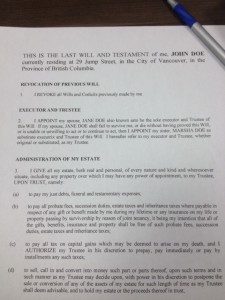4 Things to Know About Challenging a Will in Vancouver

Challenging a Will in Vancouver? Four Facts You Should Know
When challenging a will in Vancouver, it’s important to know BC’s new Wills, Estates and Succession Act (“WESA”) has had some important changes.
Our Vancouver law firm frequently gets questions about challenging a will — when someone you know has passed on and the contents of their will are revealed, it’s not uncommon to feel that what you’ve been left is less than what you deserve. Perhaps you assisted the deceased greatly in the last months leading up to his or her death, or maybe long ago the deceased promised he/she would leave you the summer home. These are situations in which you could have a valid legal claim.
As the law provides a variety of bases on which to challenge a will, it’s important to look up a lawyer that understands Estate Planning & Litigation to discuss your particular situation.
The list below provides some basic information you should know about challenging a will.
1) Claims against a will must be brought within approximately 180 days.
In BC’s new Wills, Estates and Succession Act (“WESA”), which comes into force March 31, 2014, section 61 provides that a person seeking ‘variation’ of a will must bring their claim within 180 days of the date the representation grant is issued in BC. The representation grant is issued to the person nominated by the will-maker to act as their executor in probating the will.
2) Only the spouse or child(ren) of a deceased can bring a wills variation claim against the deceased’s estate.
Under both the current legislation (the Wills Variation Act) and the new legislation (WESA – coming into force March 31, 2014), only a spouse or child of the deceased can apply to vary a deceased’s will. The legislation gives the court a fairly broad discretion to vary wills that do not make “adequate provision for the proper maintenance and support of the will-maker’s spouse or children”. In a claim against a will brought by a spouse or child, the court may order that a provision that it thinks adequate, just and equitable in the circumstances be made out of the will-maker’s estate for the spouse or children.
If you are not the spouse or child of a deceased person, you may still have a valid legal claim that does not fall under the legislation, but rather is founded on another legal basis (either in common law or equity/trust law, for example). It is important to consult a legal professional to determine if your claim against a will has merit.
3) A will-maker can legally transfer the majority of their assets outside of the estate, though it may be possible to challenge those transfers.
In order to avoid high probate fees (taxes), it is common and legal to use alternative methods to transfer assets to beneficiaries outside of the estate.
Common will and estate transfers to avoid high probate fees include:
- Outright gifting of assets prior to death
- Listing designated beneficiaries on bank accounts and insurance policies
- Putting assets into trust
- Listing a person as joint tenant on property
In some cases, it may be possible to successfully challenge those transfers on the basis of incapacity, undue influence or fraud, the transferred asset was promised to someone else, or in the circumstances the law would presume a loan instead of a gift, for example.
When transfers are successfully challenged, those assets are put back into the will-maker’s estate and subject to division and disposition. A law firm that handles Estate Planning & Litigation can help you determine the validity of any claim you may have.
4) Legal fees are often charged on a contingency basis.
Contingency means the lawyer only receives compensation if your claim is successful. Lawyers practicing in this area often charge legal fees on a contingency basis. This is a great benefit to clients who would otherwise be unable to bring a claim for financial reasons. A lawyer should be willing to discuss how they structure their fees in the initial client consultation.
If you would like to speak with our law firm about challenging a will or estate planning & litigation, please don’t hesitate to contact us here.

